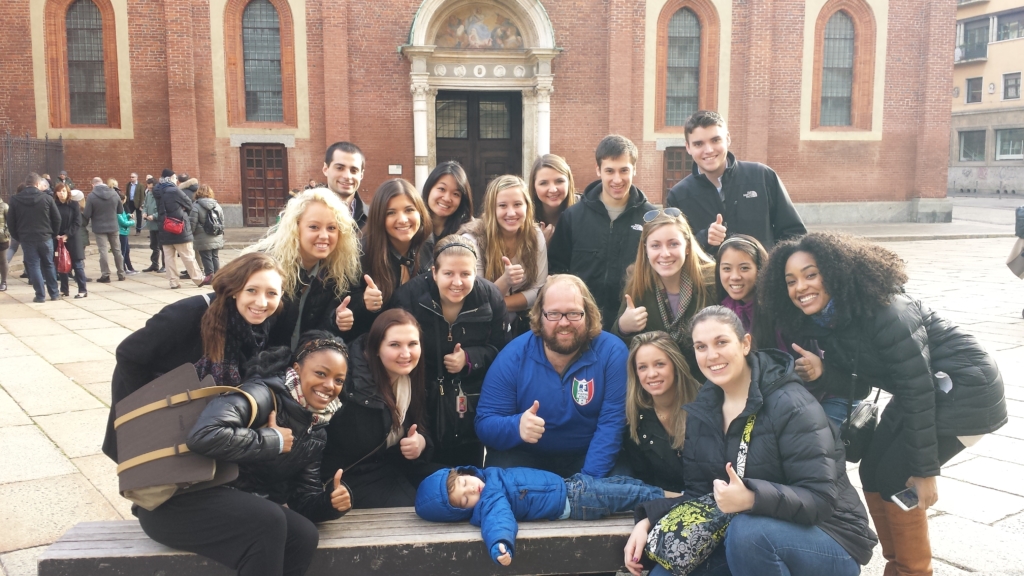
Mark Wolters, in blue, poses with a group of Gies College of Business students on a trip in Milan, Italy. They are posing in front of the Santa Maria della Grazie, home of Da Vinci’s Last Supper. The boy sleeping on the bench is Wolters son who accompanies his family on their travels around the world and who became a sort of mascot for the class study abroad trip.
When traveling to Madrid, don’t eat the Paella in the town center. They’re frozen and cooked in the microwave.
In Buenos Aires, be careful which soccer jersey you choose to wear around the city. You may get a finger wag from locals who root for the other local team. (And, don’t call it a soccer jersey, Americans. It’s fútbol in Argentina and in almost every other country.)
Heading to Japan? Don’t forget your JR pass train ticket before your arrival. You can’t buy it in country, and it will pay for itself several times over as you venture outside of Tokyo. (And you definitely want to travel outside of Tokyo.)
You’ll find these and thousands more practical travel tips at Wolters World, a YouTube travel channel with more than 1,000 videos and more than 3 million followers each month.
Creator and host Mark Wolters has traveled to more than 70+ plus countries, beginning in high school when he took his first study abroad trip to Australia. He’s also a professor of marketing at University of Illinois’ Gies College of Business and a passionate advocate for students studying in other countries.
“The biggest benefit to studying abroad is it really opens your eyes to the world. Everybody has blinders on, but seeing other people’s perspectives helps open them a little wider. You start to understand the differences in cultures, but also start to see the similarities,” Wolters tells Poets&Quants.
“It becomes a self actualization kind of experience. You learn a lot about yourself, and it gives you a better chance to be independent. You can’t default to Mom and Dad because they don’t know how you get cable in Portugal or the best diarrhea medicine when you’re in China. That independence, that maturity, is one of the greatest changes I see when students study abroad.”
PRACTICAL ADVICE FOR STUDYING ABROAD
The first time Wolters went abroad was driving across the Ambassador Bridge with his family into Windsor, Ontario, Canada. At eight years old, he was entranced by the loonie, a Canadian one-dollar coin, and the idea that even money was different in other countries.
In high school, he got talked into his first study abroad by an exchange student from South Africa, and he’s never stopped traveling. As a student, he studied in Australia, Finland, Argentina, Brazil and Portugal. As a teacher, he’s been to dozens of other countries and often takes college students on course trips overseas.
Wolters is one of P&Q’s 50 Top Undergrad Professors from 2020 and a USA Today No. 1 Independent Travel Videographer. We recently sat down with Wolters to talk practical tips for students considering a study abroad. From transferring credits to where to live to paying for the trip, here’s some of Wolters’ tried and true advice for getting the most out of your experience.
MAKE AN APPOINTMENT WITH THE STUDY ABROAD OFFICE
One of the first things you should do if you’re considering a study abroad experience is make an appointment – or several – at your school’s study abroad office, Wolters says. And know that there may be more than one office to visit.
At the University of Illinois, for example, there is the university-wide study abroad office as well as one specific to the Gies College of Business. The people in the offices are experts in study abroad logistics, the numerous and varied programs that are available, financing, transferring credits and more. Use them.

taking a tour of Gies students around Venice, Italy heading out to the Murano Glass factories
GETTING CREDIT FOR CLASSES TAKEN ABROAD
Remember, first and foremost, that studying abroad isn’t a vacation from studying. With the cost of a college education, students need to be able to earn credits that actually count toward their graduation. Doing the important planning work ahead of time will help ensure that classes transfer back to your home institution and your major.
Wolters offers the following tips to ensure students don’t end up needing an extra semester (or more) to complete their degrees:
Choosing between a private or university-sponsored program: Here, again, is where the experts in the study abroad offices can be invaluable. Gies, for example, has direct relationships with 15 international universities and accepts every course taken from their campuses, Wolters says. This may not be the case with privately run study abroad programs.
“I think that’s where students need to be the most careful when they’re looking at where to go: Will the classes transfer? They need to get those things taken care of beforehand,” Wolters says.
While private programs may suit your goals and desires more directly, students need to be aware their home universities may not accept courses as credit. If they don’t, it may be better to take advantage of those private opportunities during summer or winter breaks where it won’t interfere with your graduation schedule.
Map our degree credit requirements early: Another important factor Wolters tells students is to have a solid roadmap of your degree’s credit requirements before making your travel abroad plans. Not all schools offer required courses every semester. So, if you want to study overseas in your junior or senior year, and if a required course is offered during your trip, you need to make sure you can take it the semester before or after.
Get overseas classes approved before you leave: When you have your destination school picked, look at the class schedules early to match them with your degree requirements. Get pre-approval from your home school professors and admissions folks to make sure your desired classes will transfer.
“Make sure they say it’s okay and get it in writing, because someone’s saying it doesn’t count. Have an email with that confirmation,” Wolters says.
Also, whenever you’re picking classes, look for courses that have titles that are very similar to courses from your home school. For example, if you need a required course in business administration from your home school, look for one with “business administration” in the title of the host school. It will make the case for transferring credits that much more straightforward.
Consider online classes: Does your degree or college require a class only offered during your study abroad semester/year? See if you can take the class online.
Since the pandemic, many schools offer classes students can take online – whether they be 100% asynchronous or a hybrid between live virtual and online coursework. For example, Wolters teaches a required marketing class at Gies in the spring semester, and about 13% of his students take it online while studying abroad.
Taking a couple of online classes from your home institution will also help free up the schedule during your study abroad so you have more flexibility for other pursuits essential to the experience – like traveling in the host country and taking advantage of culturally immersive activities.
Request study abroad grades before leaving: True, some schools and professors will not release grades early, but it never hurts to ask. But getting grades early, especially for students studying overseas in their senior year, can help you secure proper credit for courses you need to graduate.
Take a class you can’t take at home: Finally, be sure to pour through the course catalogs at the host institution. They likely have classes not available to you at home.
For example, Barcelona’s business school specializes in marketing and has close to 50 different classes in the subject ranging from sports marketing to marketing on Instagram. Think about your major and what you want to get out of it, and look for specialized classes you wouldn’t otherwise have access to.











Questions about this article? Email us or leave a comment below.